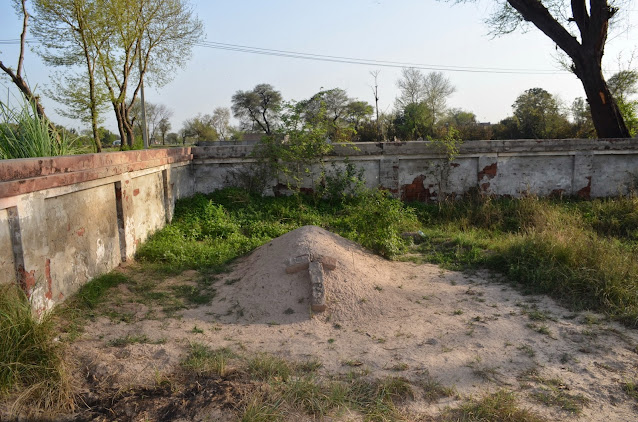When the storm of the Indian Mutiny of 1857 broke out across northern India, the fate of the British Empire in the subcontinent hung in the balance for several months. Different regions and communities chose sides based on their own historical experiences, geography, social dynamics, and personal interests.
Punjab, however, remained largely peaceful. Although a few regiments stationed at Lahore, Sialkot, Jhelum, and Mardan mutinied, their efforts were poorly coordinated and geographically isolated from the main centers of rebellion. More importantly, they found little local sympathy—rather, they often faced open hostility from the people of Punjab. This ensured their uprisings were crushed swiftly and brutally by the British.
The people of Punjab—both Muslims and Sikhs,chose to side with the British, though for different reasons. Many Muslims welcomed British rule after being freed from what they viewed as the oppressive rule of the Sikhs, following the annexation of Punjab in 1849. On the other hand, Sikhs were treated relatively generously by the British, and the princely states of eastern Punjab remained loyal to the Raj. Many Sikhs were also eager to fight against the Mughal emperor of Delhi, whom they viewed with animosity. Both Muslims and Sikhs were also motivated by the opportunity to share in the plunder of grand cities like Delhi and Lucknow.
Similarly, the Pashtun tribes of the northwestern frontier sensed the prevailing winds and aligned themselves with the British cause. It’s important to remember that this was 1857—well before the concept of Indian nationalism had taken root among the general population. Even iconic figures like the Rani of Jhansi were not fighting for India’s liberation as a nation, but rather seeking to defend their own territories and settle personal scores with the British.
In such a climate, most of Punjab’s influential figures were eager to please the new rulers in hopes of gaining favor and rewards. Yet one notable exception stood out, Rai Ahmad Khan Kharal.
The trouble likely began when the British administration at Gogera (then the district headquarters) tried to enlist the support of the Kharal tribe in suppressing the mutiny in Delhi and beyond. Rai Ahmad Khan Kharal, a respected local leader, refused to cooperate. This refusal escalated into open conflict.
The first major clash occurred on the night of 26 July 1857, when Kharal and his followers attacked the Gogera jail and freed all the prisoners. In retaliation, the British began arresting suspected rebels and burning villages along both banks of the Ravi River, in present-day Okara and Faisalabad districts—the Kharal homeland.
Ahmad Khan Kharal remained active across a wide area, but leading an armed resistance against the might of the British Empire was no easy task. As always, there was no shortage of informants. Tragically, it was a fellow Kharal—Sarfraz Khan Kharal of Kamalia—who betrayed Ahmad Khan’s plans to the Assistant Commissioner of Gogera, Lord Berkeley.
Berkeley led a force to attack Ahmad Khan Kharal, who had taken position in the forests of Gashkori. Kharal fought bravely and repelled Berkeley’s initial assault. However, the British officer lay in wait, hiding in nearby woods. Seizing the moment while Ahmad Khan was offering Zuhr prayers, Berkeley ambushed and killed him. This incident occurred on the 10th of Muharram, 1274 AH, which corresponds approximately to 30 August 1857 (though this date is not definitively confirmed).
Today, the tomb of Rai Ahmad Khan Kharal stands at 31°04'28.50" N, 73°20'01.70" E, in District Faisalabad. It is not easily accessible, as the surrounding road network primarily consists of narrow local roads connecting one chak (village) to another.
To reach the site, travel to Tandlianwala, a town located about 50 kilometers south of Faisalabad. From there, ask for directions to Jhamra, the hometown of Ahmad Khan Kharal. His tomb lies approximately 5 kilometers from Jhamra.
A few days after the martyrdom of Rai Ahmad Khan Kharal, his close friend Murad Fatiana avenged his death by killing Lord Berkeley, the Assistant Commissioner of Gogera, while he was crossing the Ravi River on horseback.
Berkeley is buried in a small cemetery just outside the town of Gogera, in a north-eastern direction. The condition of the cemetery is extremely poor—its boundary walls are crumbling, and there are no headstones, making it impossible to identify his grave with certainty. However, there are signs suggesting the presence of a few notable graves. Most of the compound is flat, overgrown with wild grass, some of it partially burned. The cemetery is located at 30°57'51.50" N, 73°19'55.00" E. Gogera itself lies on the main Okara–Faisalabad Road, approximately 20 kilometers from Okara.
Rai Ahmad Khan Kharal stands as a unique figure in our history— the only tribal chief in Punjab who rose against the British during the uprising of 1857. While others across the province aligned themselves wholeheartedly with the British, offering their loyalty in exchange for “honours” and vast jagirs, Ahmad Khan Kharal chose a different path. He got his head cut off, but never bowed it before the oppressor.
Long live Rai Ahmad Khan Kharal Shaheed.
So ended the lives of the two main characters in this extraordinary chapter of our history، Rai Ahmad Khan Kharal, the rebel chief, and Lord Berkeley, the British officer. Each, in his own way, fulfilled his duty. They now lie buried just 12 kilometers apart, on opposite banks of the River Ravi. May they rest in peace.
View Tombs of Rai Ahmad Khan Khral & Lord Berkley in a larger map
.jpg)
.jpg)
.jpg)
.jpg)
.jpg)
.jpg)






